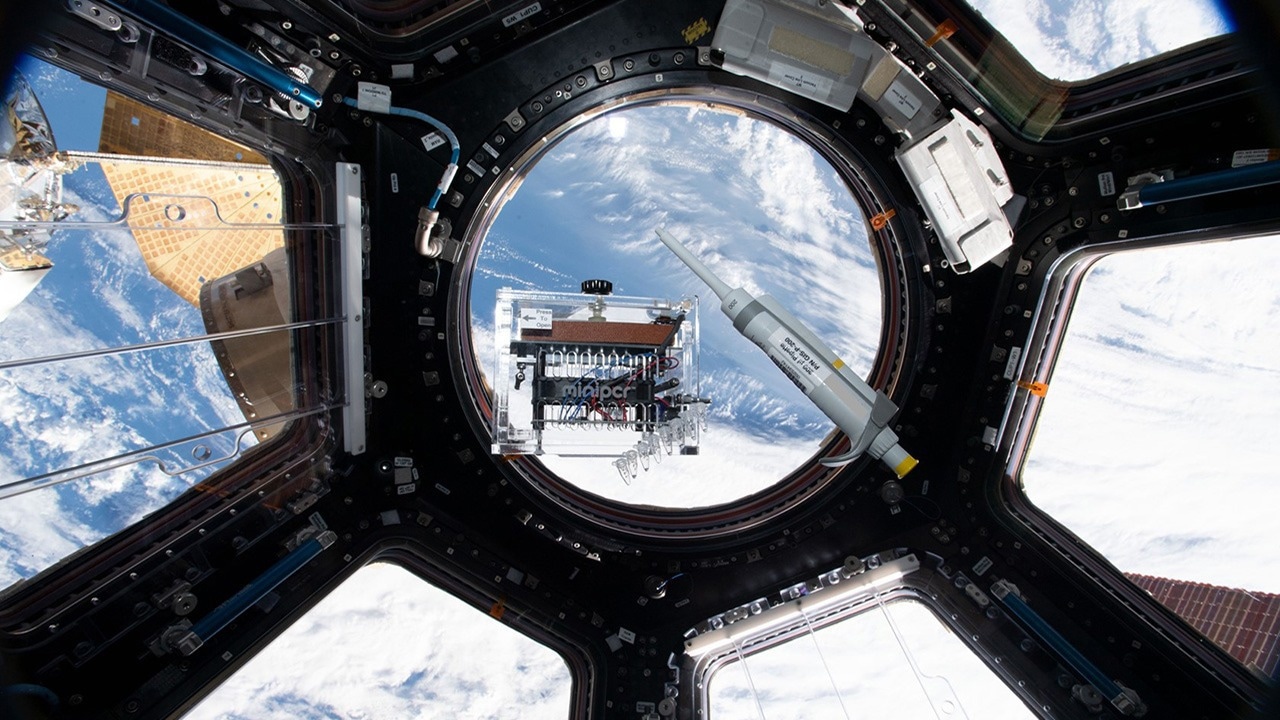For nearly a decade, Genes in Space™ has challenged students to develop spaceflight experiments that use biotechnology to address spaceflight challenges. Founded by Boeing and miniPCRbio, the program relies on distinct tools that can be used individually or in conjunction with one another to carry out research investigations on the International Space Station (ISS). To provide student researchers with even more options and expand the capabilities of the Genes in Space toolkit, Boeing is partnering with NASA and the ISS National Laboratory® to launch an investigation to the space station to test protocols that can be used as a foundation for future student Genes in Space investigations.
 A view of the miniPCR machine in the cupola on the International Space Station. Image Credit: NASA
A view of the miniPCR machine in the cupola on the International Space Station. Image Credit: NASA
The investigation will fly on Northrop Grumman’s 20th Commercial Resupply Services (NG-20) mission, slated to launch to the space station on January 29, 2024. Instead of launching samples that will be analyzed in space, the investigation focuses on collecting samples directly from the space station and then analyzing those samples in orbit.
To that end, crew members on station will collect samples from the ISS water recovery system (WRS) and leverage existing onboard Genes in Space microbiology tools to conduct an end-to-end characterization of the microbial community within the WRS. The crew members will use miniPCR and MinION for DNA extraction and sequencing, along with the fluorescence viewer to achieve the first accurate and complete genomic profile of the WRS.
“A true assessment of the WRS has never been conducted,” said Sarah Wallace, a NASA microbiologist. “Typically, samples are collected in space and returned to the ground for analysis, which does not provide a true characterization of the microbial community.”
According to Wallace, previous investigations by this team have utilized a very targeted based sequencing approach, but this investigation aims to move beyond that. “We’re taking a true metagenomic approach with this investigation, where we’re sequencing any DNA that we can capture,” said Wallace.
To do that, the miniPCR device will help ensure the material is in a form the sequencer can recognize. The MinION tool will then sequence all the DNA in the samples. “This method will give us a new tool to use and allow us to collect as much information as possible,” said Wallace. “Therefore, this method will give us all the information about the microbial community within various areas within the WRS.”
Wallace says the investigation will focus on the WRS because by the time samples are returned to Earth, there are only a few organisms detected, typically in higher quantities, which is not an accurate characterization. “We know that we probably started with a pretty diverse microbial community, but over time, one or two things grow in the sample return bags and basically take over—all the other organisms are consumed or outcompeted and die out,” she said. “This is really beautiful science because it will help us understand what we have on the ISS and also help us to inform future spaceflight systems, like those for use on the Moon and Mars.”
Boeing's Scott Copeland, co-founder of Genes in Space, said, “Students who participate in the Genes in Space competition have an opportunity to contribute significantly to our collective understanding of space biology. We are excited to collaborate with NASA to test additional protocols that can be offered to student researchers in future Genes in Space competitions.”
Additionally, Wallace says this investigation will enable students applying to the Genes in Space program to propose new and different ways to use the miniPCR technology beyond traditional amplifications. “Genes in Space is just pure science for the students,” she said. “And this investigation will expand on that.”
Applications for the current Genes in Space competition opened on January 10, 2024. To learn more about the program and how to apply, visit the Genes in Space website.
The ISS National Lab and NASA will host a prelaunch science webinar on January 26 at 1 p.m. to discuss a variety of research investigations slated to launch on NG-20. For more information and to register, please visit our webinar advisory.